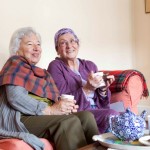The British Geriatrics Society (BGS) has launched the first of a two-part guidance on the recognition and management of older patients with frailty in community and outpatient settings.
Called Fit for Frailty, it has been produced in association with the Royal College of General Practitioners (RCGP) and Age UK, and aims to be an invaluable tool for social workers, ambulance crews, carers, GPs, nurses and others working with older people in the community.
The guidance will help them to recognise the condition of frailty and to increase understanding of the strategies available for managing it.
In the guidelines the BGS calls for all those working with older people to be aware of, and assess for frailty. It dispels the myth that all older people are frail and that frailty is an inevitable part of ageing. It highlights the fact that frailty is not static – like other long term conditions it can fluctuate in severity.
Frailty can be explained as a loss of physical and psychological reserves, which leads to increased vulnerability, and can mean that just a small change in health such as a minor infection could result in never getting back to a pre-existing state of health or independence. This in turn can lead to a move to a care home or even death.
The problem is that frailty very often goes unnoticed. Besides older people themselves and their GP, the delivery of care will often involve other agencies like social services, community teams and the ambulance service.
All these professionals need to consider issues such as the symptoms of frailty and signs to look out for and what to do or who to call before a crisis happens.
 Dr Gill Turner – BGS Vice President -clinical quality and Fit for Frailty project group lead said “Given the current emphasis on emergency admissions and older people – it is perhaps not surprising that the words ‘frail’ and ‘frailty’ are used almost interchangeably with ‘older’.
Dr Gill Turner – BGS Vice President -clinical quality and Fit for Frailty project group lead said “Given the current emphasis on emergency admissions and older people – it is perhaps not surprising that the words ‘frail’ and ‘frailty’ are used almost interchangeably with ‘older’.
“Yet more than 50% of people over the age of 85 will not have frailty. For those who do, we need to carefully consider how health and social care can best be of service”.
The BGS believes that knowledge that an older person has frailty is invaluable and should set off a pathway of activity involving a holistic review along the lines of Comprehensive Geriatric Assessment.
Professor Nigel Mathers – Honorary Secretary of the RCGP said ”People with frailty are not necessarily known to their GP as significant users of the health service and may not have big care packages.
“Frailty can often go unnoticed until adverse effects are already happening and many older people might not have their long term conditions actively managed. The RCGP therefore welcomes Fit for
Frailty as an essential resource for GPs and other health professionals in community settings”.
 Caroline Abrahams, Charity Director at Age UK says: “As the older population continues to increase it is likely more of us will be living with frailty. However, with the right approach this does not have to mean living in poor health or in constant need of health and care services.
Caroline Abrahams, Charity Director at Age UK says: “As the older population continues to increase it is likely more of us will be living with frailty. However, with the right approach this does not have to mean living in poor health or in constant need of health and care services.
“At the moment too often older people who are frail and living with multiple conditions end up in a crisis situation with no other choice but to be admitted into hospital or a care home.
“By taking a proactive approach that takes account of the whole person, such a crisis can be prevented and longer-term quality of life improved.
“The NHS needs to change the way it looks at an older patient. Frailty and complex health needs do come with their own challenges, but this is all the more reason to commit to and invest in ways of working that support older people using the specialist knowledge that sits behind this guidance. If we can get this right it will help to sustain the health, wellbeing and quality of life for everyone, regardless of age”.




